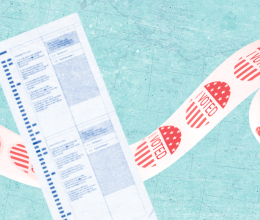On January 6, Governor DeWine signed HB 458 into law, radically altering Ohio elections – and not for the better. This legislation contains many changes detrimental to election accessibility and thus the power of Ohio voters.
The new anti-voter law:
- Forces in-person voters to use an unexpired photo ID to vote, during the early voting period, or on Election Day. There are only four acceptable photo IDs. They are an Ohio driver’s license, an Ohio-issued state identification card, a U.S. or state military ID, or passport.
- Limits drop boxes to one location per county and may only be open during business hours during early voting.
- Shortens the absentee ballot request window; ballots now must be requested a full week before Election Day - the previous Tuesday by 5pm - as opposed to the previous Saturday by noon.
- Adds citizenship as a designation on driver’s license and state ID cards.
- Eliminates the last day of early voting, the Monday before Election Day.
- Mandates that absentee ballots must be received by County Board of Elections 4 days after Election Day, as opposed to ten days.
- Changes curbside voting rules so that only those with a physical disability or those physically unable to enter a polling location are eligible for this option.
- Shortens the window to cure provisional ballots from seven days to four days.
The most egregious of these updates is the requirement of a photo ID, which has been deemed one of the strictest voter ID laws in the country. To some, this change may seem trivial. All Ohioans 18+ have a photo ID, right? Photo IDs are required for other activities – purchasing alcohol, boarding a plane, driving a car – why not voting? The truth of the matter is, voting is not just a cornerstone of our democracy, but a fundamental right for all Americans, unlike choosing to purchase alcohol or driving a vehicle. In this blog, we’re exploring how HB 458 will impact communities throughout the state and why it harms Ohio voters.
Those With/Without a Photo ID
Ohio’s strict new voter ID requirement only perpetuates the false narrative that every voter already has a requisite ID. More than 10% of U.S. citizens do not have government-issued photo identification, with minority voters disproportionately lacking this specific type of ID. Harsh voter ID laws often reduce voter turnout, while furthering a dangerous nationwide trend of lawmakers passing suppressing legislation that unfairly impacts BIPOC voters. Additionally, voter impersonation is exceedingly rare, making this discriminatory legislation a solution to a virtually nonexistent problem.
Military Members
Under the new legislation, military members are permitted to use a U.S. military ID card, an Ohio National Guard ID card, or a U.S. Department of Veterans Affairs ID card to cast their vote. Unfortunately, these provisions excludes the use of county-issued veterans’ identification. This important footnote only creates confusion among military voters and blurs the reasoning for why this law was created. Furthermore, HB 458’s (baseless) shortening of the mail-in ballot period also negatively impacts military members who frequently utilize absentee ballots to vote. The Associated Press noted in a recent report that more than 200 military ballots in Franklin County alone arrived after Election Day, with almost 40% received four or more days after Election Day. Voting while overseas already requires extra planning and consideration. Adding further time constraints only drives a wedge between those serving our country and the ballot box.
Out-of-State Students
Ohio is home to 14 four-year public universities and more than 50 private colleges and universities, in addition to numerous community and technical colleges. This includes one of the largest universities in the nation – The Ohio State University – with more than 60,000 students. HB 458’s strict regulations requiring voters to have an ID issued by Ohio make it harder for out-of-state students to vote, despite them residing in Ohio for most of the year. The communities surrounding their respective colleges and universities impact students’ well-being and livelihood, just like they affect permanent residents. Constructing barriers to voting only diminishes the voices of the next generation of leadership in our state.
During a time in which harmful legislation is slowly chiseling away at our democracy, HB 458 only adds another chip in the block. Rather than strengthening the ties between communities and legislators, these severe deteriorations to our election process will create chaos and confusion for voters and poll workers alike. Make no mistake, these regressive changes were designed with little to no evidence to support them and to directly hinder turnout. At the ACLU of Ohio, we are committed to protecting the right to vote for ALL Ohioans by both advocating for fair, accessible policy solutions and firmly condemning legislation, like HB 458, that only deters individuals from undertaking their civic duty.
Read up on ways that you can prepare yourself and others for the upcoming election, we have five proactive steps for you to take today!





